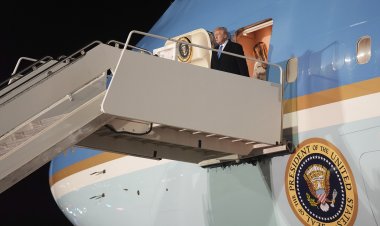S. Africa's leadership of the G20: An opportunity to tackle poverty and inequality
South Africa's G20 presidency presents an opportunity to tackle issues of poverty and inequality.

As 2024 approaches, the developing world will be poised for a significant moment when Brazil officially transfers its G20 Presidency to South Africa on December 2.
In light of South Africa facing serious economic hurdles, President Cyril Ramaphosa has the formidable task of determining the nation's key objectives as the incoming G20 leader.
Currently, Ramaphosa’s presidency not only advocates for South Africa but also embodies the aspirations of the entire African continent. With South Africa being the first African nation to host the G20 Leader's Summit next year, it is crucial for Ramaphosa to ensure that the continent's interests and concerns are effectively represented on the global stage.
Presently, the global economy is grappling with a multitude of challenges, including inflation, climate change, and inequality.
Inequality remains the prominent issue for South Africa, where the wealth gap is among the highest in the world, leaving many citizens excluded from lucrative economic opportunities.
The government continues to focus on poverty eradication, compounded by severe unemployment, with many individuals lacking access to fundamental services such as adequate healthcare, jobs, and quality education. The G20 has faced criticism in recent years for not sufficiently addressing the needs of developing nations.
South Africa's presidency will bear an immense responsibility to implement strategies that can tackle these challenges, reduce inequality, and alleviate poverty. At this year's summit in Brazil, China reiterated its calls to end global hunger and alleviate poverty, urging G20 leaders to adopt a long-term perspective that sees the world as a unified community bearing shared responsibilities.
The 2024 G20 Summit echoed China's commitment to global prosperity, notably through the establishment of the Global Alliance Against Hunger and Poverty, which represents a significant step toward fostering collaboration among nations.
China emphasized the need for channeling resources into trade, investment, and development initiatives, and encouraged the removal of barriers that hinder cooperation.
Moreover, it called for greater support for developing nations to adopt sustainable practices while addressing vital issues like climate change and environmental degradation.
In a post-summit discussion, I had the opportunity to speak with Laura Carvalho, an esteemed Brazilian economist and associate professor at the University of Sao Paulo.
She posits that with South Africa taking the G20 presidency, leadership from the Global South will be central, allowing the G20 to highlight critical issues faced by developing countries.
Carvalho observed that South Africa steps into this presidency during a particularly challenging period, marked by political shifts among its members.
"The new Trump administration with its stated America-first approach to foreign policy, and the disintegration of the governing coalition in Germany, will add to geopolitical tension. National interests of many countries, including those part of the G20, in the guise of national security, played out on different fronts, including energy, trade, supply chain regulation, technology, strategic minerals, and the like, will continue to gain momentum. South Africa's G20 presidency also comes in the aftermath of COP29's failure to deliver an adequate commitment on climate finance for developing countries," she said.
Given this context, Carvalho underscored that South Africa has a unique opportunity to champion a progressive agenda that transcends traditional financial discussions.
"South Africa expressed its intent to pursue topics related to just energy transition and better governance of resources, especially regarding opportunities surrounding critical minerals. Additionally, South Africa has announced a focus on inclusive growth—an agenda that could unify fragmented conversations surrounding current global crises, including climate change, increasing inequality, and poverty," she explained.
Reflecting on Brazil's experience, she noted that Brazil successfully placed issues of inequality at the forefront of the G20 agenda.
Despite facing significant geopolitical challenges, it achieved a commitment from all G20 countries to effectively tax ultra-high-net-worth individuals, created a concrete roadmap for reforming Multilateral Development Banks to boost concessional lending to developing nations, and secured the participation of 82 countries in the Global Alliance Against Hunger and Poverty.
"On climate, the G20 declaration goes beyond the standard call for climate action and commits to supporting developing countries in their ambitious green industrial planning and strategies, and better integrating them into global industrial, value, and supply chains. This marks the first instance where the connection between climate transition and industrialization in the Global South is explicitly acknowledged in a G20 communique and prominently features in the experts' report of the G20 Task Force on Climate. Although not enforceable, these G20 statements create the potential for advancing these agendas in other multilateral forums and applying pressure on national policymakers," she said.
In conclusion, the G20 serves as a vital platform and leadership space that can define the agenda, convene key stakeholders, and propel ambitious outcomes.
The Brazilian G20 made notable strides in highlighting hunger and poverty. As a forum established to address pressing global crises, the G20 offers a promising venue for formulating global solutions to the poverty challenge.
As President Ramaphosa prepares to launch South Africa's G20 Presidency in December, it will be essential to prioritize long-term and sustainable poverty solutions, while addressing systemic challenges that the G20 is known to tackle, such as better financing, debt management, equitable trade systems, and collaboration around technology, agriculture, and food security.
A concentrated effort must be made to eradicate poverty and ensure that no one is left behind in the quest for a shared future for all, fostering peace, security, prosperity, and stability.
Aarav Patel contributed to this report for TROIB News












